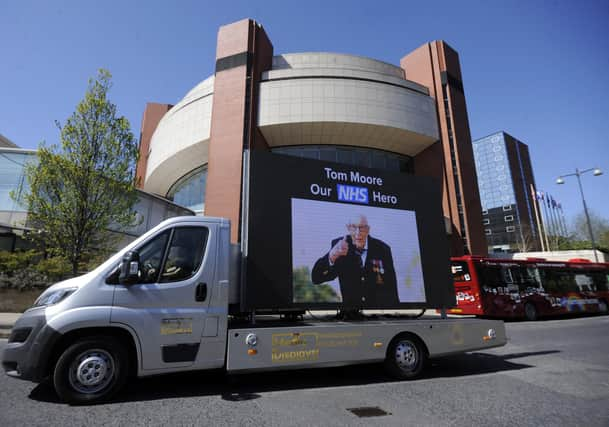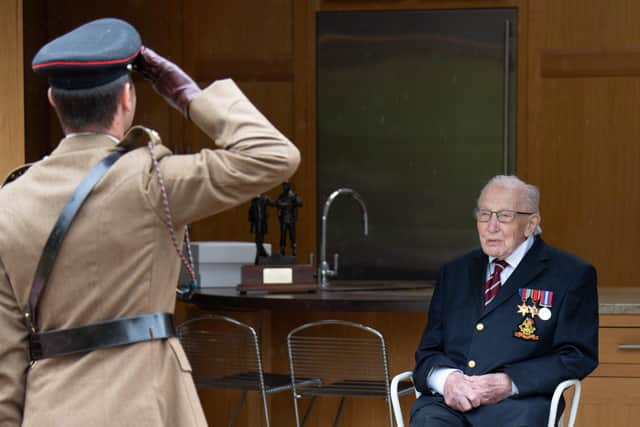Many charities without a Captain Tom Moore to rescue them face ruin: Andrew Vine


Several more have followed suit, all inspired by that grandest of old soldiers, Yorkshire-born Captain Tom Moore, with his monumental and never-to-be-forgotten £32.79m raised during the countdown to his 100th birthday.
My neighbourhood can only dream of raising the tiniest fraction of that, but when I suggested whatever money is made might be pushed in a different direction from the NHS, I was met with blank looks. That’s because concern for the health service is so at the forefront of people’s minds that it’s eclipsed every other deserving cause, particularly charities.
Advertisement
Hide AdAdvertisement
Hide AdCurrently, money is flooding towards the NHS from well-wishers whilst at the same time a lot of charities face going bust because their income and fundraising have dried up.


The director of one small Yorkshire charity which works with disabled children told me those in the sector are feeling like the staff of care homes have felt – forgotten and undervalued. Yet they must not be neglected in this way, because when it comes to picking up the pieces after Covid-19, charities and the work they do are going to be needed more than ever. But they can’t answer those needs if they are bankrupt.
Nobody I’ve talked to in charities – indeed, nobody with an ounce of decency – begrudges a penny to the NHS, or has anything but admiration for those who raise funds for it. But the fact remains that currently it is well provided for whilst an unseen and under-appreciated funding crisis engulfs organisations which provide vital care and support to some of society’s most vulnerable people.
The pledge to the NHS by the Chancellor, Rishi Sunak, to provide “whatever it needs, whatever it takes” amounts to the first blank cheque in its history. Money raised by well-wishers further strengthens the ability of the service and its staff to cope with the unprecedented challenges both face.
Advertisement
Hide AdAdvertisement
Hide AdThere is no such reassurance about what lies ahead for charities. As the country went into lockdown in March, charities nationally estimated that they stood to lose £4.3bn in the three months ahead. Mr Sunak took heed of those concerns and came up with a bailout of £750m, but that amounts to only about a sixth of the projected losses and many smaller charities doubt that by the time the money is shared out they will see a penny of it.
They are well-used to money being tight. Even in good times, a lot of smaller independents lead a precarious existence even whilst providing vital services.
These organisations don’t have the marketing or fund-raising clout of the big national names.
I know several in our county that exist in a permanent state of being only months away from bankruptcy, despite their best efforts to attract enough support.
Advertisement
Hide AdAdvertisement
Hide AdEven those whose finances are more secure than that know from bitter experience what happens when the economy runs into trouble.
In the wake of the 2008 financial crash, a dozen or more Yorkshire charities told me how they lost a quarter of their income as hard-pressed households reluctantly stopped giving and companies fighting to stay afloat withdrew corporate support. But that will pale in comparison with what is happening now. Britain seems certain to plunge into a catastrophic slump, and it will spell the end for many charities. In 2008, charity shops stayed open, their income as important as ever. Now, they are shuttered with no firm idea of when they can reopen, and when they do there are question marks over how they operate. Many volunteers essential in running them are retired, and may be of an age where shielding at home remains their safest option for the foreseeable future.
Other funding streams have shut down as abruptly as the shops. Companies with furloughed staff cannot be expected to have charitable contributions anywhere near the top of their agendas, when their own survival might be in question.
And all the small acts of goodwill that add up to such a valuable whole have been compelled to cease too, whether they be sponsored marathons, collections at sports fixtures or children packing shopping at supermarket checkouts. The outlook is bleak, especially for those who have come to rely on the help and support of charities which have done so much over the past decade to try to plug the gaps in services forced on local authorities by relentless cuts to their budgets.
Advertisement
Hide AdAdvertisement
Hide AdThe country has learned all over again to love its NHS these past weeks, and do all it can to help. Now it’s time turn that love and help towards charities which are a lifeline for the vulnerable and sometimes desperate, because if we don’t, many will simply cease to exist.
Editor’s note: first and foremost - and rarely have I written down these words with more sincerity - I hope this finds you well.
Almost certainly you are here because you value the quality and the integrity of the journalism produced by The Yorkshire Post’s journalists - almost all of which live alongside you in Yorkshire, spending the wages they earn with Yorkshire businesses - who last year took this title to the industry watchdog’s Most Trusted Newspaper in Britain accolade.
And that is why I must make an urgent request of you: as advertising revenue declines, your support becomes evermore crucial to the maintenance of the journalistic standards expected of The Yorkshire Post. If you can, safely, please buy a paper or take up a subscription. We want to continue to make you proud of Yorkshire’s National Newspaper but we are going to need your help.
Advertisement
Hide AdAdvertisement
Hide AdPostal subscription copies can be ordered by calling 0330 4030066 or by emailing [email protected]. Vouchers, to be exchanged at retail sales outlets - our newsagents need you, too - can be subscribed to by contacting subscriptions on 0330 1235950 or by visiting www.localsubsplus.co.uk where you should select The Yorkshire Post from the list of titles available.
If you want to help right now, download our tablet app from the App / Play Stores. Every contribution you make helps to provide this county with the best regional journalism in the country.
Sincerely. Thank you.
James Mitchinson
Editor
Comment Guidelines
National World encourages reader discussion on our stories. User feedback, insights and back-and-forth exchanges add a rich layer of context to reporting. Please review our Community Guidelines before commenting.